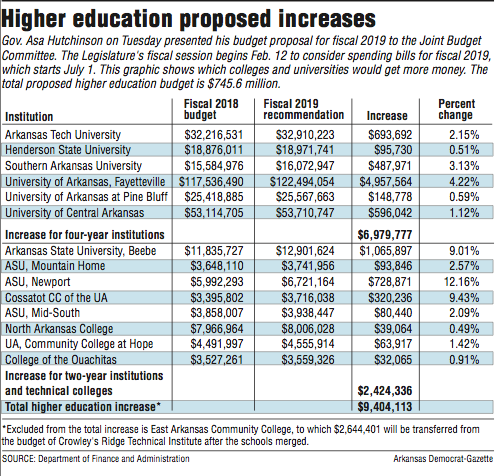The four-year universities in the University of Arkansas and Arkansas State University systems are committed to abiding by Gov. Asa Hutchinson's request to freeze in-state tuition at existing levels in the next school year, the presidents of the two systems told lawmakers Thursday.
UA System President Donald Bobbitt and ASU System President Chuck Welch made these comments before the Legislature's Joint Budget Committee.
The committee subsequently authorized legislative staff members to draft an appropriation for colleges and universities that would increase by $12 million the current general-revenue funding of $745.6 million for fiscal 2019, which starts July 1.
The increase includes $9.4 million more for the two- and four-year colleges to help implement the state's new productivity-funding formula in the coming fiscal year. The other $2.6 million reflects a shift of funding from the former Crowley's Ridge Technical Institute to East Arkansas Community College, after their merger. As a technical institute, Crowley Ridge's funding had been listed under the general education fund, so the money's shift to higher education funding appears as an increase in the latter.
Hutchinson told lawmakers Tuesday that he's seeking $10 million more to implement the new funding formula that would create "new emphasis upon student progression versus simply student enrollment."
The governor's proposed budget allocates $9.4 million of that amount on the basis of calculations in the funding formula. The rest sought by Hutchinson -- $600,000 -- is in the proposed budget but it isn't allocated, said state budget administrator Duncan Baird.
The Republican governor on Tuesday called on four-year universities to freeze tuition at current levels and on two-year colleges to limit tuition increases to the consumer price index or below. He pointed out that the four-year colleges have averaged annual tuition increases ranging from 3.03 percent to 6.2 percent during the past 10 years.
During Thursday's meeting, Rep. Mark Lowery, R-Maumelle, insisted on questioning Bobbitt and Welch about their commitment to the governor's requested freeze of in-state tuition and also whether they will freeze fee levels during the coming school year.
State Department of Higher Education Director Maria Markham said, "The system presidents have committed to a tuition freeze for in-state tuition for four-year institutions, but they are not prepared to commit to a freeze on fees" in the coming school year.
At the University of Arkansas, Fayetteville, an in-state undergraduate student is paying $3,691.80 for 15 hours of tuition and $839.25 for the same hours in fees per semester in the current school year. At Arkansas State University, Jonesboro, an in-state undergraduate student is paying $3,150 in tuition for 15 hours and $1,088.75 in fees for 15 hours per semester.
Bobbitt said, "We are very committed to the governor's request and we want it. There is no doubt about it."
He said two- and four-year colleges have very efficient operations compared with those in other states and that some fee increases requested by students are linked to campus safety.
Bobbitt warned that freezes on tuition and fees ultimately will be "a race to the bottom."
"I'm a free-market person. I believe that the consumer -- that is, our student and their families -- make very good decisions when they have very good information," he said. The Legislature has created colleges and universities that "provide a number of different points of entry" with varying costs, he said.
Welch said, "We will not be increasing [in state-tuition] at our four-year institutions as a result" of the governor's request.
But the colleges and universities may need to make adjustments and shifts in two years or three years from now under the new funding formula, he said.
"We all know that that is something that may have to happen with a radically new plan, so planning from a standpoint of guaranteeing freezes beyond one year would be extremely difficult in light of the fact you have that new funding formula," Welch said.
"We do understand the spirit of the request. Our intention at the system is going to be looking at ... trying not to increase those fees," he said. "The only way we would is if it was a critical, sensitive situation, but it would be very transparent. You would know exactly what it would be. We would be able to lay that out by dollar because the fact is, it is a fee. I have to talk to my board of trustees about this, and they will have some input into this as well."
Afterward, University of Central Arkansas spokesman Christina Madsen said UCA President Houston Davis has decided to comply with the governor's request to freeze in-state tuition in the coming school year.
"We respect and understand the governor's recommendation and the legislative budget process," Davis said in a written statement. "We will do what is necessary to ensure that our students continue to get the quality education that UCA offers."
Southern Arkansas University President Trey Berry said in a written statement that "Southern Arkansas University fully intends to adhere to Governor Hutchinson's challenge to freeze tuition this year.
"SAU had one of the lowest tuition increases last year among four-year universities in the state of Arkansas, increasing our tuition by only 1.83 percent," Berry said.
Henderson State University also supports the governor's request and will make every effort to comply, said Jennifer Boyett, vice president of university advancement at the university.
A spokesman for Arkansas Tech University could not be reached Thursday afternoon by telephone or email.
Information for this article was contributed by Aziza Musa of the Arkansas Democrat-Gazette.
Metro on 01/12/2018
